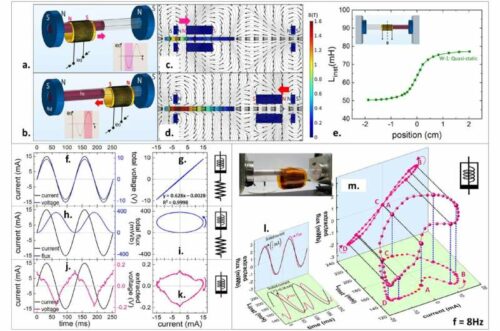Researchers have developed a conclusive report that provides first ever physical evidence of a new electrical component – a meminductor.

Electronics are mostly based on the three basic electrical components, namely resistor, capacitor and inductor. There are two additional circuit elements that were just added around 15 years ago. These newer circuit elements are known as the mem- versions of their classical counterparts, and their current and voltage properties are dependent on previous values of current or voltage in time, like a memory.
Dr. H. Rusty Harris, associate professor in the Department of Electrical and Computer Engineering at Texas A&M University, has identified a new circuit element known as a meminductor. Harris and his student created a two-terminal passive system—composed primarily of an electromagnet interacting with a pair of permanent magnets—to examine the magnetic flux density and magnetizing field strength of the inductor circuit element.
Much like mem-capacitive devices, meminductive devices, owing to their inherent energy storage properties, could potentially offer lower static power consumption than memristive devices for large-scale, energy-efficient neuromorphic computing applications. Furthermore, dynamical circuit applications of mem-elements involving local activity, edge of chaos, and resulting persistent dynamics adds more value to a physical implementation of a meminductor.
The team was able to prove the existence of the pinched hysteresis curve within the inductor leading to its mem- state, or memory-like nature, by the same definition that the memristor and memcapacitor were realized. The motion of the winding for the negative half-cycle of current results in gradually smaller winding volumes being occupied by the ferromagnetic core thus resulting in lower values of inductance.
Reference : Abhiram Dinavahi et al, Physical evidence of meminductance in a passive, two-terminal circuit element, Scientific Reports (2023). DOI: 10.1038/s41598-022-24914-y






